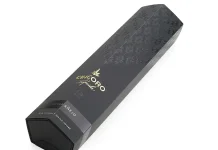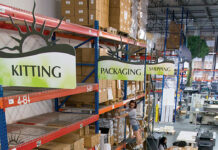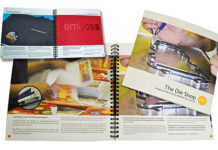by Jen Clark, The Binding Edge

Being nice and treating people fairly is more than a business philosophy at Reindl Bindery Company. It is how owners David and Steven Reindl were raised and how they, in turn, are raising their own families. But as a business philosophy, the mantra has proven beneficial for both employee longevity and sales.
The pair grew up at the full-service bindery, now located in Germantown, WI, which was started in 1978 when their grandfather and father went into business together. Over the years, Reindl Bindery has become a leader in the printing and publishing industries. The company is known for its award-winning quality, responsive service and innovative binding solutions.
“The biggest reason we are successful is because of our ability to change and adapt to the needs of our customers,” David Reindl said, noting those needs have changed a lot over the years. “It also is important for us to treat our people as family. We take an interest in our employees’ lives. I think it’s important to recognize all that they do.”
Father, son venture out on their own
In 1978, Charles Reindl was ready for something new. The 43-year veteran at Boehm Bindery decided it was time to venture out on his own. Charles’ son, Dale, who was teaching printing at a Milwaukee high school at the time, also had been considering a career change. “My dad was at the point in his career that he was looking to do something different,” David said. “He had been teaching for many years. I think he had had enough of teaching at that point.” The father and son had worked together before at Boehm Bindery, and Dale had continued to work part-time at the facility when he was in high school and while on break from college. Creating their own bindery “was an idea (my dad) had always toyed with. It was just the perfect opportunity,” David explained.
At first, Reindl Bindery took on small binding jobs and book repair for Bibles and text books. The company was located on the second floor of a building in Milwaukee, WI, and it grew as it purchased a few smaller pieces of used equipment to manufacture different types of books. In 1980, Reindl purchased the assets of Boehm Bindery and moved to a new location on North 3rd Street. Reindl then was able to produce casebound books, as well as perform other operations, making for a more versatile and complete trade bindery. In 1988, Reindl purchased a building in Elm Grove, WI, and moved for the second time. New developments within the industry allowed Reindl to be even more aggressive and after several machinery purchases, Reindl began competing nationwide and delving into new niche markets.
In 1998, Reindl moved to Glendale, WI, to accommodate the growth of its bindery offerings and customer base. Another move in 2009 put Reindl Bindery in its current 112,000 sq. ft. facility. “At times, it isn’t enough space, but at others, it’s more than enough,” David said. “For a company our size, we are in a building that is the right size right now. Were lucky though. If it comes to it, we have the ability to add floor space if needed.”
Next generation takes over

In 2007, David and his brother, Steven, took over the company from their parents, Dale and Kathy. David is the company’s president, while Steven is the vice president and Dale remains chairman of the board. “They have no active ownership in the business,” David said of his parents, “but my dad is here when he wants to be here, and he’s not when he’s enjoying retirement. He’s sort of semi-retired. He takes part in production meetings and new product development. He kind of comes and goes,” David said with a laugh. “I think he’s enjoying it a lot.”
The brothers, though, have had a role at Reindl Bindery from the beginning. “We all started when the company was founded in 1978 – I was nine years old,” David said. “We were brought in on Saturdays – I think to give my mom a break from dealing with three kids.” The boys’ jobs were far from glamorous and involved cleaning bathrooms and emptying trash cans while their father worked in the shop. This bindery is “what I’ve done since I was nine years old – in one aspect or another. We’ve both been here since the beginning,” David said. “It’s a strange feeling just switching ownership because weve been involved actively since the beginning,” he said. “We already were here doing the work – it was just a matter of making it official.”
The brothers work well together, with their personalities balancing one another. “We don’t butt heads very often,” David explained. “I would say it’s a good system of checks and balances. He’s very calm and level-headed. I’m more aggressive. We balance each other out. We rarely have any kind of conflict, but (when we do) we’re tolerant of each other’s opinions. We bring different viewpoints to the table. We have the ability to look at things from different angles.”
And, just as his father did, David brings his young children in on the weekends to get a feel for the family business. “At this point in their lives, they like to play office and go look around in the shop,” he said. But that doesn’t mean he’s pushing them into the bindery. “I would never push them to do it,” he said. “They have a long way to go before they need to make that kind of decision. I hope they would [join the business], but that’s going to be up to them.”
Family atmosphere engages employees

Even though Reindl Bindery is hiring, most of the 55 current employees have been there for 10 years or more. “Some employees have more than 20 years with the company,” David said. “The longevity is remarkable.” He attributed the loyalty to the company’s family atmosphere. One way David accomplishes that is by saying “hello” to everyone each and every day that he is at the facility. He also lets employees know how important they are to the bindery’s success. “I make a point of being around when our employees meet to get their assignments. I want them to know how important they are,” he said, noting the employees appreciate the personal interaction.
“We try to be polite and treat people nicely,” David explained. “They are our most important asset. Without them, we would be in trouble. I think it’s important to recognize what they do. Even though it’s their job and they get paid for it, I think thanking them at the end of the day for what they’ve done is important. And they appreciate that. We hold them accountable, but say thank you. It’s simple, really: Be pleasant and treat people nicely.”
State-of-the-art technology – combined with a highly experienced work force – allows Reindl Bindery to provide a solutions-based approach to meets its customers’ needs. The full service bindery serves three major markets, including education, entertainment and trade. Capabilities include cover making, casebinding, perfect binding, mechanical binding, cutting, folding, drilling, foil stamping, collating, tipping, tab cutting, round cornering, shrink wrapping and DVD/CD. Reindl mounts trays and pockets to house CDs and DVDs for several media venues such as education, music, movies, television shows and more. It also produces single or multiple panel covers for use in casebinding, wire-o and for other applications such as game boards. Cover materials, whether printed and laminated, cloth or coated, are wrapped around the board that best suits each job. Casebinding jobs can be bound in various ways, too – Smyth sewn, side sewn or adhesive bound.
“Our goal is to solve our customers’ issues and make it simple to work with us,” David said. “We do this by hiring the best people we can and instilling our company’s philosophy in each of them.” While there is no formal training process for new employees, existing operators serve as mentors by showing them the ropes. “It’s not a formalized apprenticeship,” he explained. “We look for people with mechanical aptitude and then train them to the situation by pairing them with a current operator for a period of time.”
The timelines for training new and existing operators vary, depending on the situation. When new equipment is installed, Reindl takes advantage of the training provided by the manufacturer, though not all training takes place in-house. “For example, when we put our newest perfect binder in, we sent all of our operators to Germany for training,” David said. “It’s such an important part of getting all that you can out of the equipment. You have to invest in your people. Sometimes it’s a lot harder because youre under the gun with various projects, but you have to do it because it’s better for the long-term.”
Finding success in a changing industry
In the last decade, digital publishing and changes in how people consume information have been problematic for many in the binding industry. As shorter runs became the norm, though, Reindl Bindery didn’t make significant changes to its model. “We have gone about our business,” David said.
Job orders, he said, vary between short- and long-runs. “We are seeing a haphazard work load,” David said. “We have some incredibly large orders mixed right in with small- and mid-range orders. We just ran a perfect bound job that was a quantity of 250. We also just finished a 400,000-piece hardcover job. There is no consistency, and you just never know what you’re going to get on any given day.” Taking those challenges in stride shows clients how flexible Reindl Bindery can be to work with. “Often, creative scheduling of overtime and additional shifts is the only way to make it all work,” he said.
The addition of new equipment over the last few years, such as a high-speed casing-in line and a high-speed PUR perfect binder, has given Reindl Bindery the ability to price differently because makeready and run times are faster. “Ideally, you can invest in equipment that will allow you to remain competitive,” David said. “We make our sales on our ability to always make our deliveries and take care of our customers. That always is how we’ve done business.”
Reindl Bindery offers clients creative solutions, on-the-mark estimating, best-in-class production, quality assurance and on-time delivery no matter a project’s size. It has found a niche within the entertainment industry with high-profile work that has a worldwide audience. The company produces items for the music and motion picture industries, as well as lower quantity items for local customers.
“We work on titles that are known and that are popular in the US and across the world. We work on a lot of different products with national recognition that put us in a spot that a lot of companies aren’t in because the high-profile things we are doing are pretty remarkable,” said David.

Reindl Bindery recently won a Product of Excellence Award from the Binding Industries Association for its work on a piece for the movie The Dark Knight Rises. The award recognizes the use of glue for finishing other than binding, where the application is intrinsic to the purpose of the piece, David said. “For Dark Knight Rises, we used a lenticular application without waves and made it flush to the board. Because of the UV coating, we used PUR. We had to adjust the glue pattern and build a pressing roller to pull the piece through, so it would flatten without damaging the piece. The outcome was an award-winning product that people everywhere could buy.”
Reindl Bindery also has won awards in various categories for its work on a “Friends” anniversary book that was part of a DVD collection for the hit television show; the Wausau West Yearbook; a collection of CDs titled “Paul Simon: Graceland 25th Anniversary Edition”; and a specialty hardcover book that accompanied the Bio Shock video game. The “Friends” project was an oblong book with coated stock that required making various adjustments to the machines. The Paul Simon and Bio Shock projects consisted of a lot of handwork, and the book featured tinted pages to give it a weathered feel. “For Paul Simon, the material needed to be cleaned and our machines had to be modified for the larger size of the piece. We used foam to form the inside pocket as a guide and to protect the piece during shipping so that it wouldn’t bend,” David explained.
“What we put out there are things that challenge us a little bit,” he said of the competitions the company enters. “If we win something for that, then it’s all the better. Obviously, when youre showing people your office, it’s nice to have awards all over the walls. It shows your work is at an award-winning level. It becomes a marketing tool for us.”
“Winning, for us, is like a pat on the back,” he explained. “It’s verification that we’re doing the absolute best for our customers. We take the most pride in awards that highlight things that “couldn’t be done”. That’s where you really show your level of service to your customers.”
Another hurdle for the binding industry is work that has been lost to foreign companies – ones that can produce materials that traditionally take longer, but can be completed at a cheaper rate. To combat that trend, Reindl Bindery has become more aggressive in its marketing and customer contact. “I’m personally out on the road,” David said. “We don’t have an outside sales force. I’m the one going out and meeting with customers.”
The approach is paying off because Reindl Bindery is growing its customer base. “Our marketing mostly is customer contact and website updates. We don’t send out mailers, but we do send out our company calendar each year,” he said, adding the distribution list gets larger and larger every year. “We’ve added multiple customers each month, a remarkable achievement, over the last eight to nine months. I’m using my time to get out there in front of customers and potential customers. I’m on the road several times each year, visiting places like Los Angeles and New York, as well as the central part of the country and locally – northern Illinois and Wisconsin.”
David attributes the company’s success to its ability to change and adapt to the needs of its customers. “And they’ve changed a lot over the years,” he said. “If you looked at our company five years ago, we have evolved so much. We look different, but we still do the things we’ve done from the beginning. We’ll never forget where we came from, but we have to be forward-thinking and looking at ways to compete against not only competitors in our country, but competitors in countries like Mexico and China.”
Innovation and creativity are the keys to retaining business that otherwise might go to foreign competitors, he said. “That’s where a big portion of our work will come from. I’m proud to say that is some of the stuff we’re starting to achieve. Being able to compete against Mexico is a big deal.”
Simplicity plays a role as well. “We try to make our customers’ lives as simple as we can,” David said. “It is the key to our success. It doesn’t make our lives simple – it’s exactly the opposite. But by making our customers feel like coming to us is simple, that is how we win.”




